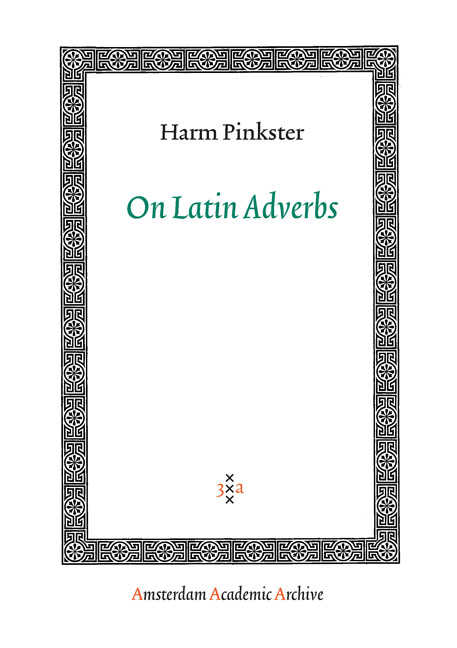Book contents
- Frontmatter
- Preface to this Edition
- Preface
- Contents
- Introduction
- 1 General Problems of Studying a Dead Language
- 2 Problems of Classification
- 3 Adverbs in Roman Grammatical Theory
- 4 The Adverb in Latin Linguistics
- 5 Adverbs as Derived Forms
- 6 Syntactic Problems
- 7 Subclassification of Adverbs
- 8 Adverbs and other Invariables
- 9 The Relationship Between Adverbs and Prepositions
- 10 Adverbs and Connectors
- 11 Adverbs and Subordinators
- Bibliography
- Indices
- Index Auctorum
- Titles Published in the Aaa Series
9 - The Relationship Between Adverbs and Prepositions
Published online by Cambridge University Press: 24 January 2021
- Frontmatter
- Preface to this Edition
- Preface
- Contents
- Introduction
- 1 General Problems of Studying a Dead Language
- 2 Problems of Classification
- 3 Adverbs in Roman Grammatical Theory
- 4 The Adverb in Latin Linguistics
- 5 Adverbs as Derived Forms
- 6 Syntactic Problems
- 7 Subclassification of Adverbs
- 8 Adverbs and other Invariables
- 9 The Relationship Between Adverbs and Prepositions
- 10 Adverbs and Connectors
- 11 Adverbs and Subordinators
- Bibliography
- Indices
- Index Auctorum
- Titles Published in the Aaa Series
Summary
This chapter will mainly deal with diachronic observations, since the relationship between adverbs and prepositions is seen in most grammars in a historical perspective. Since, however, conclusions are often drawn from this as to their synchronic relationship a discussion seems in place here. First, however, I will make a few remarks about the synchronic relationship itself in so-called classical Latin.
The synchronic point ofview
Synchronically the main difference between prepositions and adverbs is that the former do not occur independently without case forms (Kurytowicz 1949: 131; Q'Brien 1965: 101). We could leave the topic with this observation, if no intermediate type of words existed which share the characteristics of ‘pure’ adverbs and ‘pure’ prepositions. The fact of the existence of such words was mentioned in 3.1.1. with reference to Priscian 15,3,30. Thus, in answer to a question
(1) ubi locum sepulturae dederunt? ('where have they given a place for burial? ’),
we may say intra urbem and in urbe ('inside town', ‘in town’) alike. We might also answer intra ('inside’) alone. *in alone would be ungrammatical. In cases like these intra will be understood with respect to some place known to the speaker (and/or hearer), inside which the burial can take place. Grammatically, however, intra is independent. The semantic dependency is less outspoken in examples like
(2) (animalium) tota illorum ut extra ita intra forma humanae dissimilis est ('just as their outward form is wholly different from that of man, so is their inner nature'; Sen. Dial. 3,3,7),
(extra and intra function as ATTRIBUTE with forma, judging from word order and content). The ungrammaticalness of *in is confirmed by Priscian's words (15,3,30) that e, ex, a, abs, de, pro, sub, in, and others ‘never do occur without caseforms,.
Other words of the intermediate type to which intra belongs probably never occurred independently, but can be recognized without difficulty. An example is ad when meaning ‘about’ in expressions like
(3) occisis ad hominum milibus quattuor ('after about 4000 men had been killed'; Caes. Gal. 2,33,5).
If ad were a preposition there would be an accusative case form governed by it. In the examples, milibus (ablative case) is part of a normal ablative absolute construction. A similar argument holds for occurrences of praeter ('except’), prope ('about’) and iuxta ('alike’). See Kiihner-Stegmann (:1, 575-9).
- Type
- Chapter
- Information
- On Latin Adverbs , pp. 145 - 152Publisher: Amsterdam University PressPrint publication year: 2005



